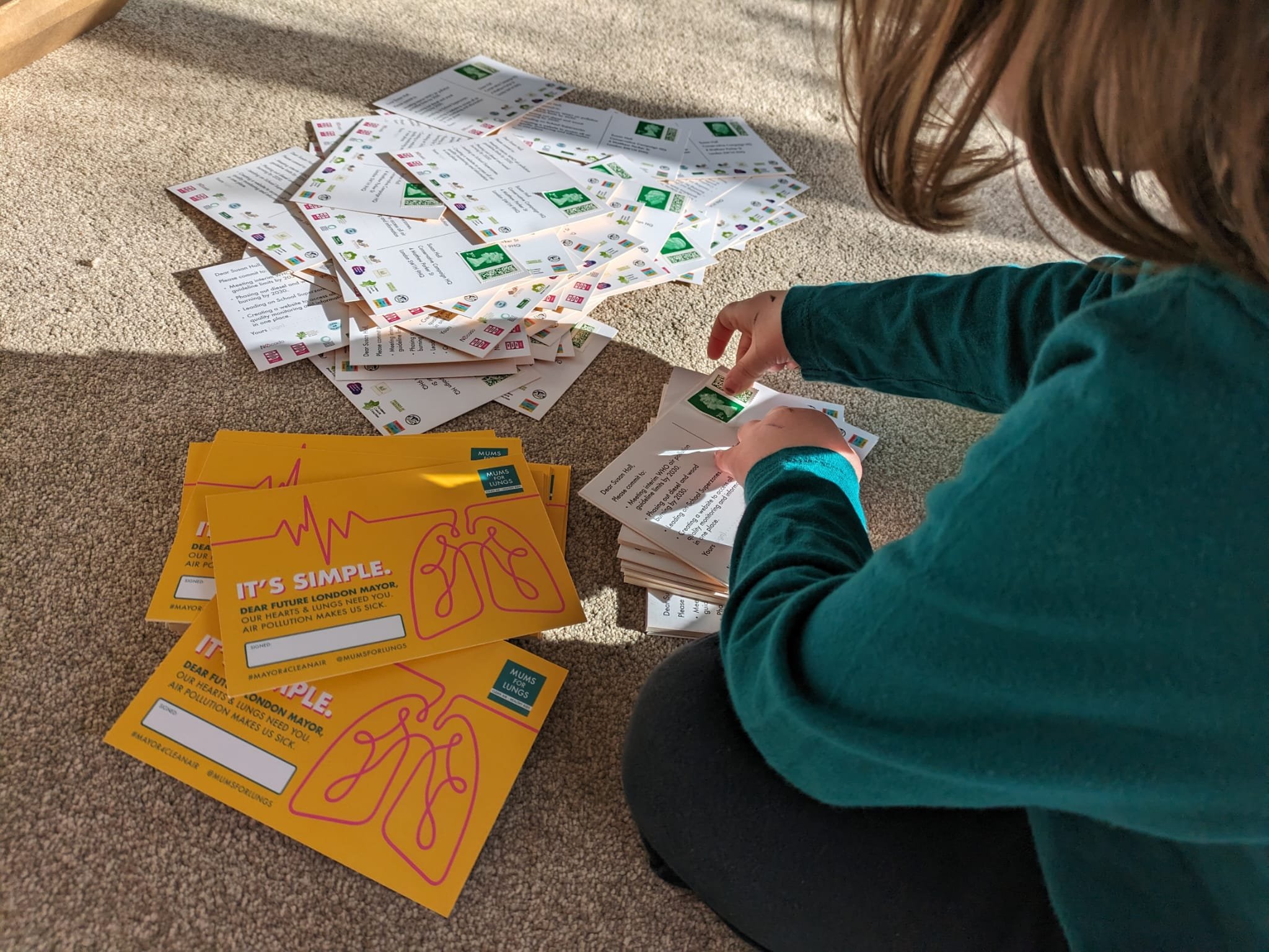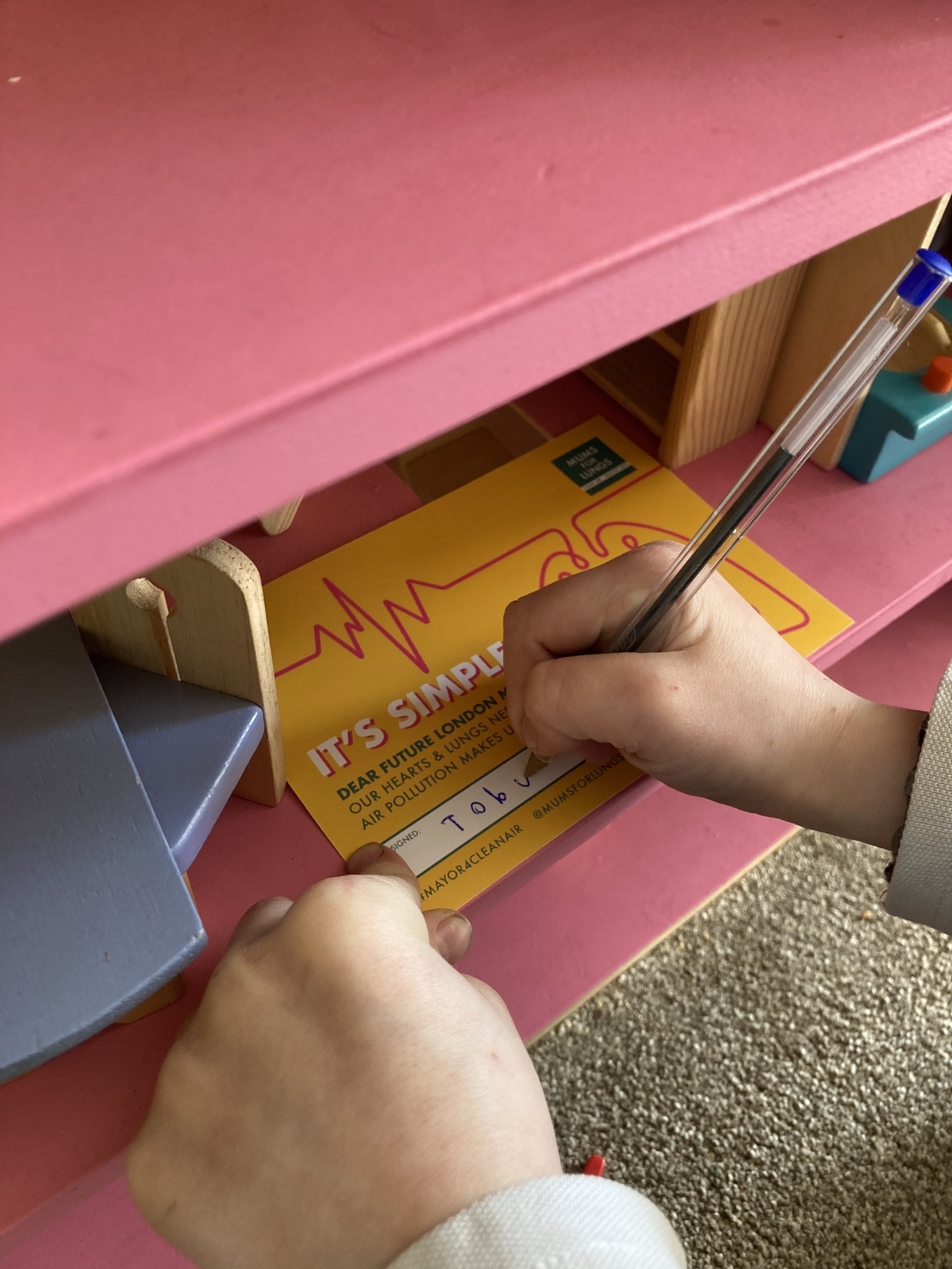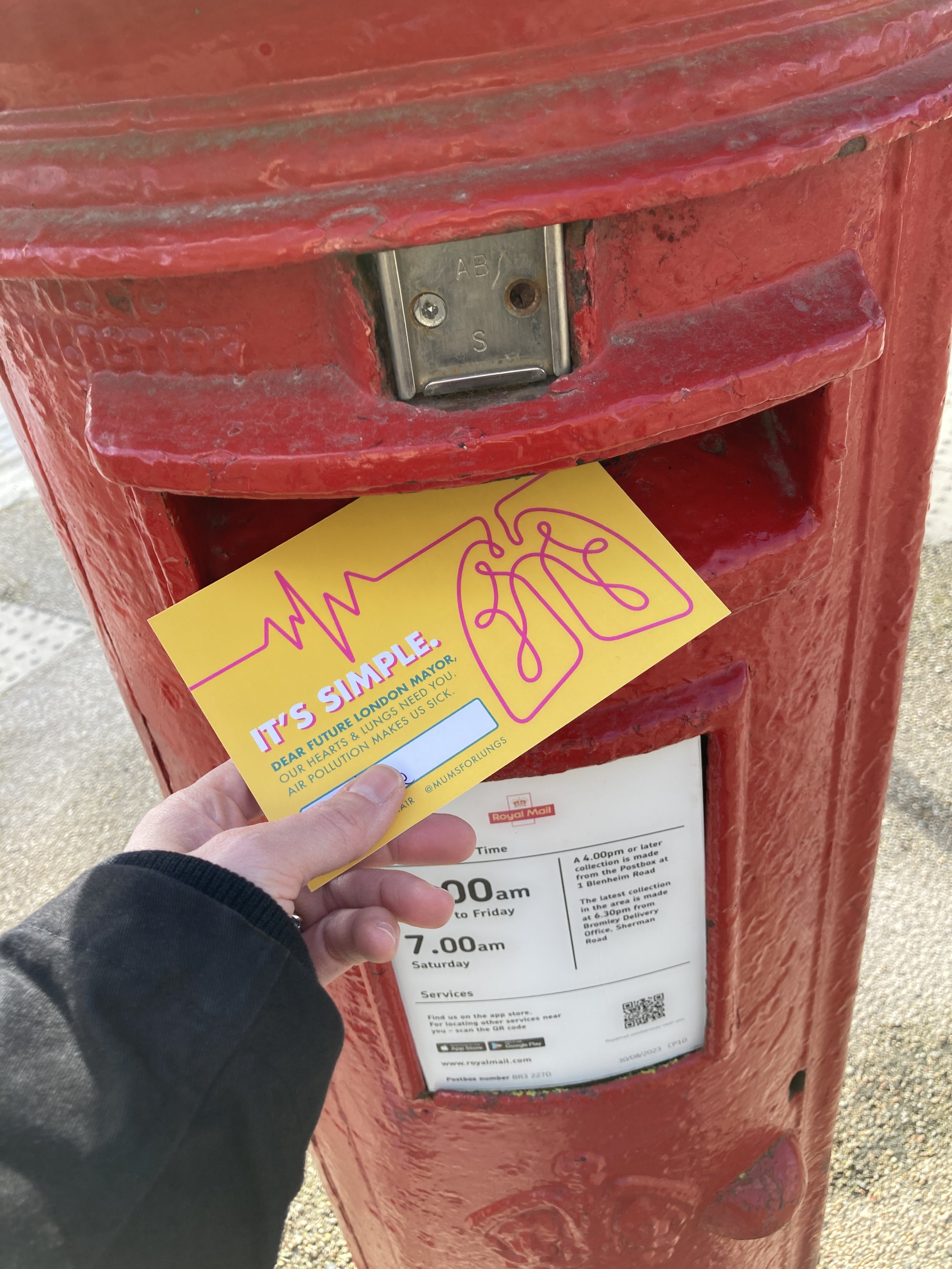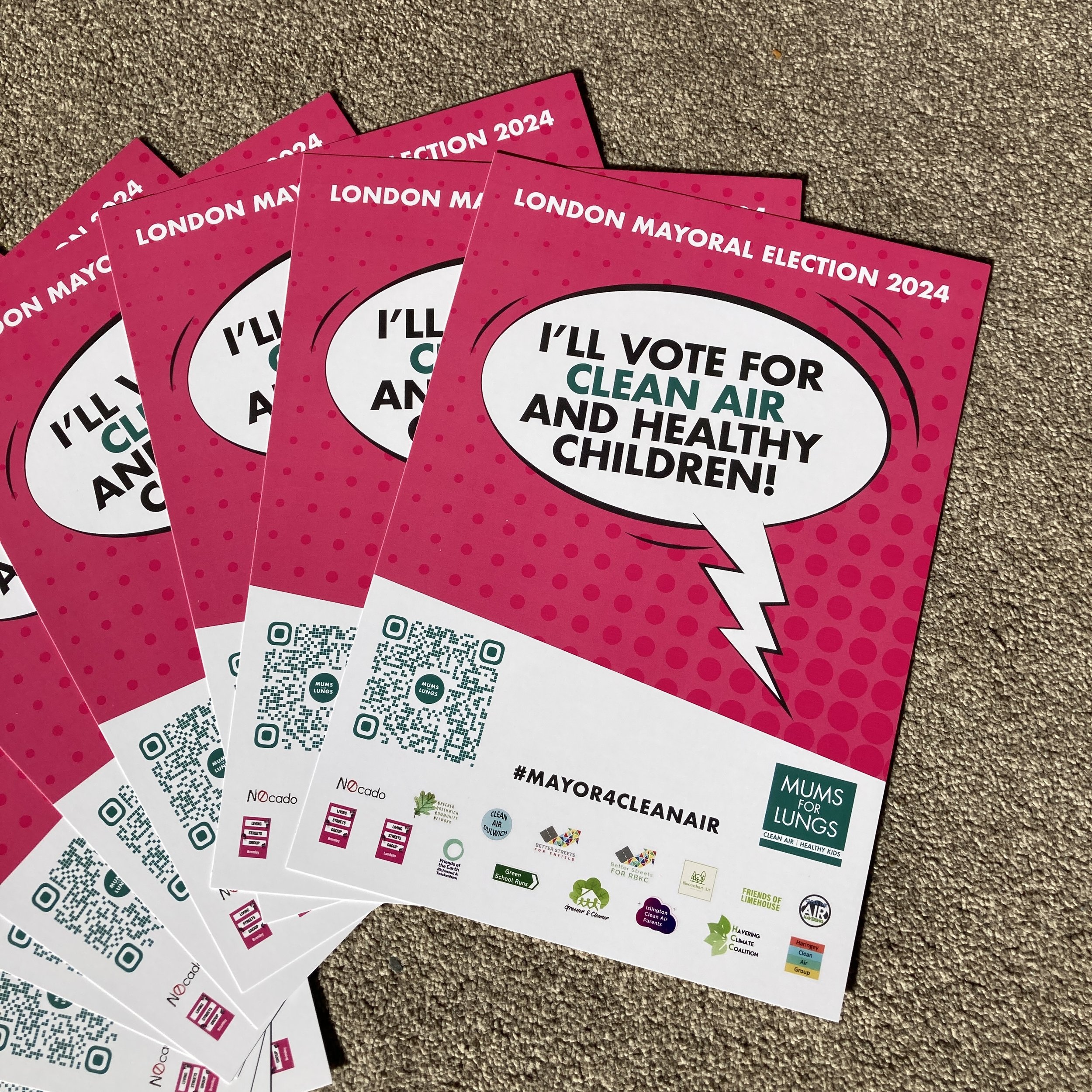London Mayoral Election 2024
For our 2024 London Mayoral election campaign we formed a coalition of campaign groups from across London to call on the Mayoral candidates to commit to strong action to tackle air pollution once elected. Despite the amount of progress made on cleaning up London’s air in previous years, it was clear that we needed London’s next Mayor to go much further to protect children from the lifelong health impacts of air pollution.
We were delighted to join together with eighteen groups across London - Better Streets for Enfield, Better Streets for Kensington & Chelsea, Bloomsbury Air, Bromley Living Streets, Clean Air Dulwich, Clear the Air in Havering, Ealing Friends of the Earth, Friends of Limehouse, Greener and Cleaner, Greener Greenwich Community Network, Green School Runs, Havering Climate Coalition, Haringey Clean Air Group, Islington Clean Air Parents, Lambeth Living Streets, NOcado, Parents for Future - West London and Richmond & Twickenham Friends of the Earth - to campaign for a #Mayor4CleanAir.
Our coalition asked the four main London Mayoral candidates for:
An unequivocal commitment for London to meet the latest World Health Organization air pollution guidelines.
This needed to include a pathway of actions, including financial support where required, to meet interim targets by 2030 at the latest including:
Phasing out diesel engines by 2030 (except for specific exemptions).
Phasing out wood burning in open fires and wood stoves by 2030.Mayoral leadership on an effective London-wide strategy to roll out School Superzones.
A state-of-the-art website for Londoners to access all air quality monitoring in one place, alongside the latest health evidence, modelling projections and reports.
Our asks in detail:
1. A commitment for London to meet the latest World Health Organization (WHO) air pollution guidelines.
In 2017, the Mayor of London committed to the Breathe Life campaign and thereby pledged to reduce fine particulate matter (PM2.5) to the now-outdated WHO recommendation of 10ug/m3 PM2.5 as an annual mean across the city.
In 2021 the WHO updated its recommendations for air quality based on strong evidence that air pollution is harmful to health at significantly lower levels than previously understood. Accordingly, the recommended annual mean of air quality levels should not exceed 5ug/m3 PM2.5 and 10ug/m3 nitrogen dioxide (NO2). In 2024, London was a long way away from this.
In the shorter term, a pathway and action to at least achieve the interim targets of 10ug/m3 PM2.5 and 20ug/m3 NO2 by 2030 at the latest was needed, including outlining how and when the updated WHO recommended guideline levels would be fully delivered.
These air quality targets are necessary to reduce the many costly health impacts that hundreds of thousands of Londoners experience regularly. This commitment realistically requires London to become ‘diesel-free’ and wood burning to be phased out.
In 2024, diesel vehicles were still the single biggest contributor to NO2 levels across London. NO2 is known to inflame the lungs and exacerbate lung conditions. We urged the next Mayor to begin phasing out diesel vehicles in the city as soon as possible. Even (ULEZ-exempt) diesel Euro VI vehicles emit disproportionately and, in many cases, illegal levels of NO2 pollution.
Wood burning is a major contributor to toxic particle pollution in London, which is already heavily polluted. Our campaign stated that solid fuel burning should be phased out from all households with access to cleaner heating sources, and asked the next Mayor to call publicly on individuals to switch to alternative heating methods and work with the government to obtain the necessary authority to do so.
2. Mayoral leadership on an effective London-wide strategy to roll out School Superzones.
In 2021, the Mayor of London was leading the development of schemes called School Superzones. These are zones around schools where actions are taken to create healthier places for children, young people and their families to live, learn and play. We urged the next Mayor to continue this work and expand leadership around protecting children's health on their way to and at school, especially those located on main roads, which are usually the most polluted ones.
Nearly all local authorities in London have implemented School Street schemes, which benefit many children across the city. However, children's health should not depend on the willingness of their respective local authorities to deliver such schemes. Moreover, School Streets only protect against traffic pollution. As the plans for the Ocado depot in Islington or the proposals to build a recycling plant at the back of a school in Lambeth highlight, children on their way to and in school require protection from more air pollution sources than just traffic. Therefore, we called on the next Mayor to lead the development and delivery of School Superzones to ensure more equal protection for all of London's children.
3. A state-of-the-art website for Londoners to access all air quality monitoring in one place.
In London, there are approximately 1000-1500 stations that monitor air pollution. These stations include the London Air Quality Network, local authority diffusion tubes, Breathe London monitors, and other monitors from commercial suppliers. Despite this wealth of data, both campaigners and policymakers struggle to easily and transparently assess whether air pollution is decreasing, or whether individual measures like road works are having any impact. The LondonAir website stores a lot of data, but it is too complex to use effectively.
We strongly urged the next Mayor to provide a single website that collates all available data, information and evidence, including modelling for 2025 and 2030. This would allow Londoners to gain real insight into the quality of the air they breathe, increase accountability and transparency, and enable local campaigners and residents to see if interventions and schemes are having any impact.
Postcards for clean air
Thank you for helping us show the main Mayoral candidates how much we need urgent action to reduce air pollution.
We designed and printed eye-catching postcards for people to send to the candidates, asking for them to prioritise action to tackle air pollution.
The postcards came with a free poster and a few suggestions for questions to help people to talk about air pollution with candidates who were door-knocking.
Thank you to everyone who ordered and then sent postcards. Hundreds were sent to the four main candidates, urging them to clean up our air.









